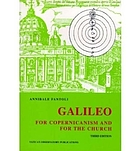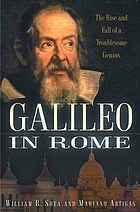 Galileo: For Copernicanism and for the Church
by
Annibale Fantoli
Galileo: For Copernicanism and for the Church
by
Annibale Fantoli
 Galileo in Rome: the rise and fall of a troublesome genius
by
William R Shea, Mariano Artigas
Galileo in Rome: the rise and fall of a troublesome genius
by
William R Shea, Mariano Artigas
